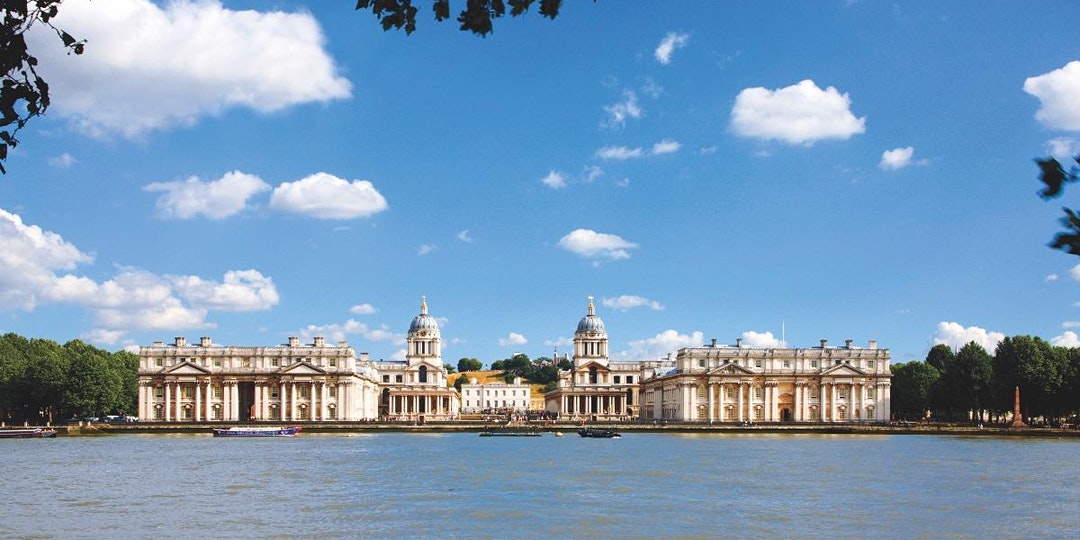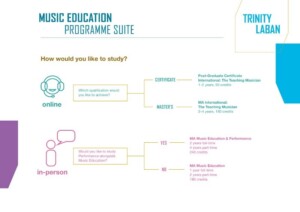Introduction
Trinity Laban is a pioneering force in music education, influential in the training of musicians for classroom teaching, 1-2-1 teaching and community music-making. We believe that students should develop the skills to work across multiple contexts, blending pedagogies as required. Our approach combines both performance and education training, focusing on the practical over the academic. We work closely with local schools, music hubs, and arts and voluntary sector organisations, offering a wide variety of placements.
To study Music Education at Trinity Laban is to be part of a dynamic community of practitioners engaged in an exciting and constantly changing professional world. With our renowned Learning & Participation department and international reputation, we work closely with leading employers, and graduates have an excellent employment record.
I am proud to lead a department with such skilled staff and such diverse, creative and engaged students. These students really make a difference to the institution – they are dynamic, articulate, critically aware, and powerful performers and communicators. They also make a positive difference to the lives of thousands of children and adult learners.
– Tim Palmer Head of Music Education
Teaching and Learning
Music Education staff exhibit a depth of experience unparalleled in a UK conservatoire. Staff come from a variety of genres and backgrounds, and are actively involved in the profession as teachers, community musicians, composers, performers and researchers. Some of our instrumental, vocal and composition teachers also teach practical pedagogy and can offer mentoring for Teaching Musician students.
As well as our own staff, we regularly invite guest speakers to engage with our students. Recent visitors have included renowned writers Anna Bull, Kathryn Deane, John Finney, Gawain Hewitt, Phil Mullen, Chris Philpott and Mary Stakelum.
Learning in the department rarely involves conventional lectures, but includes discussion, questioning, practical examples and student-led work. Most programmes have music-making embedded in each module. All teaching places the importance of creativity and an emphasis on intuitive musicality at its starting point.
Most programmes offer placements, enabling students to gain practical teaching or music leading experience. Placement hosts can include local schools and music hubs, as well as high profile arts organisations such as LSO Discovery and Glyndebourne Education. Students may also be able to work within Trinity Laban’s own renowned Learning & Participation department.
All programmes permit specialisation into particular areas of interest: past students have focussed on topics such as music with patients with dementia, and composing operas with children.
Graduates
Trinity Laban education graduates have gone into multiple areas of professional life as teaching musicians/participatory artists, often with exciting portfolio careers.
Kay Charlton has become an established composer of music education materials, and a noted presenter and teacher trainer on whole class ensemble teaching.
Ed Babar set up the acclaimed Blues & Roots Ensemble whilst on the MA MEP, successfully bidding for Arts Council funding to develop jazz education in primary schools.
Ksenija Laskova was appointed Musician-in-Residence at a school on graduating from the MA MEP in 2017, and is applying for a PhD on the social impact of music making.
Catherine Scott-Burt undertook a placement at the Junior Royal Academy as part of the Teaching Musician programme and was subsequently employed by them as a chamber music coach.
JW Johnson entered the Teaching Musician programme as a private piano and voice teacher in south India. Whilst on the programme he became a regional TCL coordinator, and is now a music teacher at the prestigious Doon School in India.
Studying a course that allowed me to delve into as specific an area of music education as I liked, while maintaining active performance training was invaluable. My ideas for the future of music education were challenged and my knowledge put into practice.
– Vikki Thomas, UK MA MEP
To view the impressive organisations that our alumni have worked with, visit Alumni Destinations.
For more information on the successes of Trinity Laban Jazz graduates and what they have to say about the course, visit Alumni Profiles.
Performance
Students on the full/part-time programmes have access to our renowned instrumental and vocal teaching staff, and to the faculty’s many outstanding ensembles, including the Symphony Orchestra, String Ensemble, Wind Band, Chapel Choir and Chamber Choir. They also have access as appropriate to the various departmental classes, looking at instrument/voice-specific technical and repertoire matters. Chamber music coaching is also offered to full or part-time students on some programmes.
Find out more about Music Performance Opportunities.
Collaboration
We regard collaborative skills as key to best practice in music education. We believe that the best music leadership is undertaken “with” rather than “to” others, and that it is vital to understand how to work alongside learners in a variety of settings. A core element of this is often the collaborative creation of improvisation and composition activities.
All students are expected to take part in CoLab each year. This ground-breaking two-week festival of student-led collaborative work across music and dance invites students to propose and lead their own process-based projects.
#ChooseTL
Your reasons to study Music Education at Trinity Laban. #ChooseTL Music Education.
Events
Postgraduate Research in Music Education Symposium 2023
10:00 – 17:00 Friday 27 October 2023 | Online via Zoom


